| Srl | Item |
| 1 |
ID:
187640
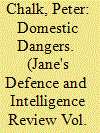

|
|
|
| 2 |
ID:
129516


|
|
|
| 3 |
ID:
171799
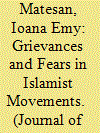

|
|
|
|
|
| Summary/Abstract |
This article examines how exclusionary policies and repressive measures affect the propensity of Islamist groups in nondemocratic settings to engage in violence. The central argument is that exclusion from electoral politics, from civil society, and from public discourse can increase political grievances, whereas symbolic threats to religious values spark sociocultural grievances; state violence and repression foster a sense of insecurity. The article proposes that Islamist groups are both principled and strategic actors, who may adopt violent rhetoric in response to political or sociocultural grievances, but who resort to violent tactics primarily out of a sense of insecurity. The quantitative examination of twenty-two Islamist groups from the Middle East confirms that exclusionary policies can spark violent rhetoric, whereas repression and threats to the physical integrity of a group increase the propensity toward violent behavior. However, when insecurity turns into disillusionment, groups can also move away from violence if they feel alienated from the public. The close investigation of the Muslim Brotherhood and al-Gama'a al-Islamiyya in Egypt shows that the response to repression depends on the length of the conflict, the level of fragmentation within an organization, and public opinion.
|
|
|
|
|
|
|
|
|
|
|
|
|
|
|
|
| 4 |
ID:
160879
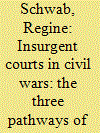

|
|
|
|
|
| Summary/Abstract |
As part of research on the meso-foundations of conflict, the field of ‘rebel governance’ examines political institutions that regulate the affairs of civilians in wartime as well as their relations with armed actors. Judicial institutions play an important role in this and research has shown that they are widespread among both historical and current insurgencies. However, usually these bodies have been analysed in the context of one hegemonic faction like the Tamil Tigers in Sri Lanka and the Afghan Taliban. What is missing so far is an analysis of different pathways of (trans)formation of rebel courts. As exemplified by the three case studies of judicial institutions in Eastern Ghouta, Idlib and Aleppo, these are shaped by the distribution of power between ‘same-side’ groups, yielding unipolar, bipolar, or multipolar constellations. The analysis is located on the meso or movement level of insurgent social structures, complementing research on the micro and macro levels.
|
|
|
|
|
|
|
|
|
|
|
|
|
|
|
|
| 5 |
ID:
059564
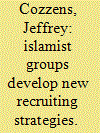

|
|
|
| 6 |
ID:
175706
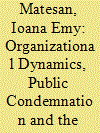

|
|
|
|
|
| Summary/Abstract |
This article examines under what conditions armed Islamist groups intentionally demilitarize and de-legitimize violence, and under what conditions they deprioritize violence temporarily. The central argument is that the decision to de-escalate is driven by the interaction between political context, organizational dynamics and public attitudes. When violence becomes costly and non-violent alternatives are available, groups have incentives to pause armed action, but they do not necessarily feel the pressure to change their ideological tenets or permanently renounce military capabilities. However, when organizational weakness reaches a point of crisis, and when the public explicitly condemns groups, leaders are faced with a sink or swim scenario that forces them to reconsider the role of armed action and the very mission of the group. The ability of leaders to impose any changes in the behavior, ideology or organizational structure depends on the cohesion of the organization. Internal fragmentation can lead to behavioral escalation, but it can also eliminate the most hardline elements from a group, which facilitates organizational transformations from the top. The empirical discussion traces the complete demilitarization and renouncement of violence within the Egyptian Gama’a Islamiyah, and the more hesitant deprioritization of violence within the Indonesian Jama’a Islamiyah.
|
|
|
|
|
|
|
|
|
|
|
|
|
|
|
|
| 7 |
ID:
115417
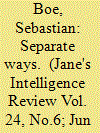

|
|
|
| 8 |
ID:
148614
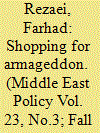

|
|
|
| 9 |
ID:
114260
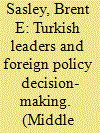

|
|
|
|
|
| Publication |
2012.
|
| Summary/Abstract |
This article seeks to contribute to our understanding of Turkish foreign policymaking, which is an under-developed area of study. It does so by examining the role of individual leaders in the foreign policymaking process. It compares two Islamist prime ministers - Necmettin Erbakan and Recep Tayyip Erdogan - and the difference in their levels of emotional attachment to Islam and their pragmatism. The findings are also relevant for a more informed understanding of the potential outcomes of the revolutions in the Arab world, where attention to Islamist groups and their preferences have become paramount.
|
|
|
|
|
|
|
|
|
|
|
|
|
|
|
|